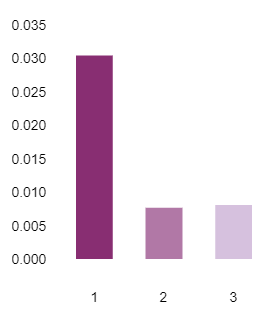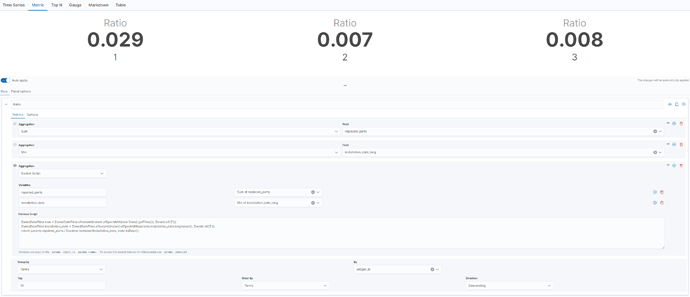Demo data
PUT widget?include_type_name=true
{
"mappings": {
"_doc": {
"properties": {
"widget_id": {
"type": "long"
},
"installation_date": {
"type": "date"
},
"@timestamp": {
"type": "date"
},
"replaced_parts": {
"type": "short"
}
}
}
}
}
PUT widget/_doc/1
{
"widget_id": 1,
"installation_date": "2020-03-27T07:47:16.316Z",
"@timestamp": "2020-04-27T07:47:16.316Z",
"replaced_parts": 0
}
PUT widget/_doc/2
{
"widget_id": 2,
"installation_date": "2019-08-07T07:47:16.316Z",
"@timestamp": "2020-04-27T07:47:16.316Z",
"replaced_parts": 0
}
PUT widget/_doc/3
{
"widget_id": 3,
"installation_date": "2018-08-07T07:47:16.316Z",
"@timestamp": "2020-04-27T07:47:16.316Z",
"replaced_parts": 0
}
PUT widget/_doc/4
{
"widget_id": 1,
"installation_date": "2020-04-27T07:47:16.316Z",
"@timestamp": "2020-04-27T07:47:16.316Z",
"replaced_parts": 1
}
PUT widget/_doc/5
{
"widget_id": 2,
"installation_date": "2019-08-07T07:47:16.316Z",
"@timestamp": "2019-12-27T07:47:16.316Z",
"replaced_parts": 1
}
PUT widget/_doc/6
{
"widget_id": 3,
"installation_date": "2018-08-07T07:47:16.316Z",
"@timestamp": "2019-04-27T07:47:16.316Z",
"replaced_parts": 2
}
PUT widget/_doc/7
{
"widget_id": 1,
"installation_date": "2020-04-27T07:47:16.316Z",
"@timestamp": "2020-04-27T07:47:16.316Z",
"replaced_parts": 0
}
PUT widget/_doc/8
{
"widget_id": 2,
"installation_date": "2019-08-07T07:47:16.316Z",
"@timestamp": "2020-01-27T07:47:16.316Z",
"replaced_parts": 1
}
PUT widget/_doc/9
{
"widget_id": 3,
"installation_date": "2018-08-07T07:47:16.316Z",
"@timestamp": "2019-04-27T07:47:16.316Z",
"replaced_parts": 3
}
Elasticsearch DSL
GET widget/_search
{
"size": 0,
"aggs": {
"widget": {
"terms": {
"field": "widget_id",
"size": 100
},
"aggs": {
"installation_date": {
"min": {
"field": "installation_date"
}
},
"repaired_parts": {
"sum": {
"field": "replaced_parts"
}
},
"ratio": {
"bucket_script": {
"buckets_path": {
"installation_date": "installation_date",
"repaired_parts": "repaired_parts"
},
"script": """
ZonedDateTime now = ZonedDateTime.ofInstant(Instant.ofEpochMilli(new Date().getTime()), ZoneId.of('Z'));
ZonedDateTime installation_date = ZonedDateTime.ofInstant(Instant.ofEpochMilli(params.installation_date.longValue()), ZoneId.of('Z'));
return params.repaired_parts / Duration.between(installation_date, now).toDays();
"""
}
}
}
}
}
}
Result
{
"took" : 2,
"timed_out" : false,
"_shards" : {
"total" : 5,
"successful" : 5,
"skipped" : 0,
"failed" : 0
},
"hits" : {
"total" : 9,
"max_score" : 0.0,
"hits" : [ ]
},
"aggregations" : {
"widget" : {
"doc_count_error_upper_bound" : 0,
"sum_other_doc_count" : 0,
"buckets" : [
{
"key" : 1,
"doc_count" : 3,
"installation_date" : {
"value" : 1.585295236316E12,
"value_as_string" : "2020-03-27T07:47:16.316Z"
},
"repaired_parts" : {
"value" : 1.0
},
"ratio" : {
"value" : 0.029411764705882353
}
},
{
"key" : 2,
"doc_count" : 3,
"installation_date" : {
"value" : 1.565164036316E12,
"value_as_string" : "2019-08-07T07:47:16.316Z"
},
"repaired_parts" : {
"value" : 2.0
},
"ratio" : {
"value" : 0.00749063670411985
}
},
{
"key" : 3,
"doc_count" : 3,
"installation_date" : {
"value" : 1.533628036316E12,
"value_as_string" : "2018-08-07T07:47:16.316Z"
},
"repaired_parts" : {
"value" : 5.0
},
"ratio" : {
"value" : 0.007911392405063292
}
}
]
}
}
}
Kibana 6.8
Table
If you have to display a table, the closest result I got is the following, which requires defining a scripted field I named installation_since_days in the index pattern:
ZonedDateTime now = ZonedDateTime.ofInstant(Instant.ofEpochMilli(new Date().getTime()), ZoneId.of('Z'));
ZonedDateTime installation_date = ZonedDateTime.ofInstant(Instant.ofEpochMilli(doc['installation_date'][0].getMillis()), ZoneId.of('Z'));
return Duration.between(installation_date, now).toDays();
You will not get the ratio, but the raw numbers.
The enhanced table plugin by @fbaligand should help you compute the ratio.
Vega
{
"$schema": "https://vega.github.io/schema/vega-lite/v2.json",
"data": {
"url": {
"%context%": true,
"index": "widget",
"body": {
"size": 0,
"aggs": {
"widget": {
"terms": {"field": "widget_id", "size": 100},
"aggs": {
"installation_date": {"min": {"field": "installation_date"}},
"repaired_parts": {"sum": {"field": "replaced_parts"}},
"ratio": {
"bucket_script": {
"buckets_path": {
"installation_date": "installation_date",
"repaired_parts": "repaired_parts"
},
"script": "ZonedDateTime now = ZonedDateTime.ofInstant(Instant.ofEpochMilli(new Date().getTime()), ZoneId.of('Z'));ZonedDateTime installation_date = ZonedDateTime.ofInstant(Instant.ofEpochMilli(params.installation_date.longValue()), ZoneId.of('Z')); return params.repaired_parts / Duration.between(installation_date, now).toDays();"
}
}
}
}
}
}
},
"format": {"property": "aggregations.widget.buckets"}
},
"mark": "bar",
"encoding": {
"x": {"field": "key", "type": "ordinal", "axis": {"title": false}},
"y": {"field": "ratio.value", "type": "quantitative", "axis": {"title": "Ratio"}}
}
}
Visual result:
Elasticsearch SQL Variant
Elasticsearch SQL requires a Basic license.
This works only with 7.5+ because the DATE_DIFF was introduced on 7.5.
GET _sql?format=txt
{
"query": "SELECT widget_id, SUM(replaced_parts)/DATE_DIFF('days', MIN(installation_date), TODAY()) AS ratio FROM widget GROUP BY widget_id"
}
Result
widget_id | ratio
---------------+--------------------
1 |0.030303030303030304
2 |0.007518796992481203
3 |0.00792393026941363
This enables you to use Canvas!
Canvas
As a Table:

Expression code:
filters
| essql
query="SELECT widget_id, SUM(replaced_parts)/DATE_DIFF('days', MIN(installation_date), TODAY()) AS ratio FROM widget GROUP BY widget_id"
| table
| render
Or as a histogram:

Expression code:
filters
| essql
query="SELECT CAST(widget_id AS INTEGER), SUM(replaced_parts)/DATE_DIFF('days', MIN(installation_date), TODAY()) AS ratio FROM widget GROUP BY widget_id"
| alterColumn "widget_id" type="string"
| pointseries x="widget_id" y="ratio" color="widget_id"
| plot defaultStyle={seriesStyle bars=0.5} legend=false
| render
Other solutions
TSVB (with installation_date as long)
Another solution might exist with TSVB, but it requires to index the installation_date as long, expressed in epoch as min/max aggregations work only on numeric values.
This is an Ingest pipeline to index the installation_date converting it into a long into the field installation_date_long while indexing (you have to pass ?pipeline=convert_to_long):
PUT _ingest/pipeline/convert_to_long
{
"description": "converts the date to epochmilli (long)",
"processors": [
{
"script": {
"lang": "painless",
"source": "ctx.installation_date_long = ZonedDateTime.parse(ctx.installation_date).toInstant().toEpochMilli();"
}
}
]
}
It would work both for 6.8 and 7.x.
Transform Job
On 7.2+ we introduced Dataframes / Transform Jobs.
It is a way to define a continuous job which turns out time-based data into entity centric indices.
In your case, the entity is the widget.
POST _transform/_preview
{
"source": {
"index": [
"widget"
]
},
"pivot": {
"group_by": {
"widget_id": {
"terms": {
"field": "widget_id"
}
}
},
"aggregations": {
"installation_date": {
"min": {
"field": "installation_date"
}
},
"repaired_parts": {
"sum": {
"field": "replaced_parts"
}
},
"ratio" : {
"bucket_script": {
"buckets_path": {
"installation_date": "installation_date",
"repaired_parts": "repaired_parts"
},
"script": """
ZonedDateTime now = ZonedDateTime.ofInstant(Instant.ofEpochMilli(new Date().getTime()), ZoneId.of('Z'));
ZonedDateTime installation_date = ZonedDateTime.ofInstant(Instant.ofEpochMilli(params.installation_date.longValue()), ZoneId.of('Z'));
return params.repaired_parts / Duration.between(installation_date, now).toDays();
"""
}
}
}
}
}
Full transform:
PUT _transform/widget_process
{
"source": {
"index": [
"widget"
]
},
"pivot": {
"group_by": {
"widget_id": {
"terms": {
"field": "widget_id"
}
}
},
"aggregations": {
"installation_date": {
"min": {
"field": "installation_date"
}
},
"repaired_parts": {
"sum": {
"field": "replaced_parts"
}
},
"ratio": {
"bucket_script": {
"buckets_path": {
"installation_date": "installation_date",
"repaired_parts": "repaired_parts"
},
"script": "ZonedDateTime now = ZonedDateTime.ofInstant(Instant.ofEpochMilli(new Date().getTime()), ZoneId.of('Z')); ZonedDateTime installation_date = ZonedDateTime.ofInstant(Instant.ofEpochMilli(params.installation_date.longValue()), ZoneId.of('Z')); return params.repaired_parts / Duration.between(installation_date, now).toDays();"
}
}
}
},
"dest": {
"index": "widget_entity"
},
"sync": {
"time": {
"field": "@timestamp",
"delay": "1h"
}
}
}





